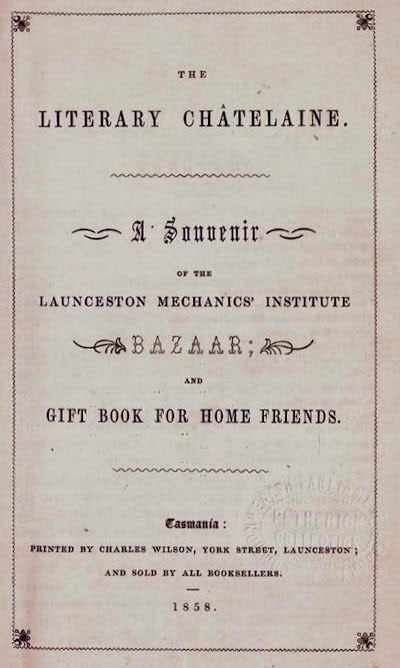With the literary world about to celebrate Anthony
Trollope's 200th anniversary (he was born on 24 April 1815) it is timely to
recall his extended stay in Australia in 1871-72, and the colonial response to
the man described by Nigel Starck as Australia’s "first visiting celebrity
in popular culture."(1)
Trollope visited all of the colonies during his year and two
days sojourn, and spent time in Tasmania in January and February 1872. Coverage
of the visit in the local press is a curious mixture of adulation tempered by a
fear that he might take away with him an unfavourable impression.
To illustrate, here is a report from The Mercury (Monday 29
Jan 1872, p3) of a short speech Trollope made in Hobart;
Mr. Trollope accepted an invitation to be present at a banquet given to the Hon. Mr. Dunn at the Town Hall, and in his response to the toast of his health, Mr. Trollope gave, in a few words, the impressions he had received of us from a few days' sojourn in the South. He said:-"Perhaps, as a stranger, you will expect that I should say something about the things I have met in this and the other colonies, (Yes, yes.) I did not come among you to teach you, but rather to learn something from you. (Cheers.) I did not come to tell you what I thought but to learn what you think; but on such an occasion as this, and after the speeches we have heard, I cannot refrain from making a few remarks. I think your position here is a happy one. You are placed in a colony having everything around you to make life happy. Your genial climate and fertile soil produce everything tending to promote good spirits, and you are surrounded by everything God can give to please man. (Cheers.) I find, however, you have one terrible drawback-a drawback sufficient to destroy all your happiness. You all think you have been ruined. I find that is the common expression of every gentleman who speaks to me of Tasmania. Every gentleman speaks to me of the loveliness of the climate, the beauty of the scenery, all that promotes happiness, but still he considers the colony has been ruined. The army has been removed, and with it some £350,000 of British expenditure has been withdrawn, and the colony ruined. I speak tenderly on this point, knowing I may tread on some one's corns, but I believe that the colony has been blessed by the withdrawal of the army. In my opinion the withdrawal of the army was one of the greatest blessings that ever occurred to the colony. You have chosen to take upon you like men the work of independent self-government. You have chosen to say you won't be servants or bondmen, even of the mother country (cheers); and yet you complain that the mother country has withdrawn the army, and ruined the colony by so doing. Being independent you carry on a government of your own, have Ministers of your own; being beholden to the mother country for nothing but allegiance, surely you do not want a body of 200 men of the mother country's army merely to show you the beauties of a red coat. Gentlemen, I find you live in happiness and plenty, with every prospect of success..."
The Mercury spends the balance of its report mounting a counter-argument
and attempting to justify the colonists' position.
One wonders how often since that speech have these two
contradictory positions been simultaneously held in Tasmania – that we live in the best place on earth and that we are totally ruined?
Looking over the shelves of the Launceston Mechanics'
Institute collection, it is clear that Trollope was a favoured author, and that
his works were well-read. All of his major works are held, including the Palliser novels and the Chronicles of Barsetshire, many in early
editions. There are three copies of Orley Farm, all dated 1862 and including a
second printing. Trollope's Autobiography (1883) is held, in a hybrid set of
first (vol I) and second (vol II) editions. There are first editions of The
Claverings (1867) and of North America (1862).
 |
| Frontispiece from Orley Farm. Illustration by John Everett Millais |
But the Institute had an even closer encounter with the
great writer when he visited Launceston in the party of the Governor during
Launceston Cup week of 1872. The group arrived late in the evening on 5
February, and their itinerary included a visit to the Chudleigh caves and Corra
Linn as well as attendance at the race meeting. The Governor and "his
suite" also attended a concert at the Mechanics' Institute given by the
Carrandinis.
It would seem that the Board of Management decided to invite
Trollope to visit the Institute because among their correspondence is a brief
note from the author to William Wathen (Institute Secretary from 1860-1900) regretfully declining. They may not have got their man,
but they did at least obtain his autograph.
 |
| Anthony Trollope's letter to William Wathen |
(1) Dr Starck has retraced Trollope's visit to the colonies in a
recently published book The First Celebrity: Anthony Trollope’s Australasian
odyssey (Lansdowne Media)


